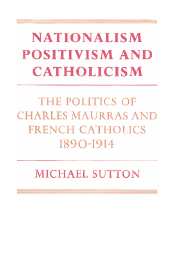 Nationalism, Positivism and Catholicism
Nationalism, Positivism and Catholicism Book contents
- Frontmatter
- Contents
- Dedication
- Acknowledgements
- Introduction
- 1 Maurras's appreciation of Comte
- 2 Individualism, the decline of France, and Maurras's proposed remedy
- 3 The time of the separation of Church and State
- 4 Blondel and Maurras
- 5 Laberthonnière's separation between politics and Christian faith
- 6 Orthodoxy and Rome
- Epilogue
- Notes
- Index
- Cambridge Studies in the History and Theory of Politics
4 - Blondel and Maurras
Published online by Cambridge University Press: 22 September 2009
- Frontmatter
- Contents
- Dedication
- Acknowledgements
- Introduction
- 1 Maurras's appreciation of Comte
- 2 Individualism, the decline of France, and Maurras's proposed remedy
- 3 The time of the separation of Church and State
- 4 Blondel and Maurras
- 5 Laberthonnière's separation between politics and Christian faith
- 6 Orthodoxy and Rome
- Epilogue
- Notes
- Index
- Cambridge Studies in the History and Theory of Politics
Summary
Theologico-philosophical justification of Maurras's politics challenged by Blondel
Several months after the publication of the last article on Maurras in Etudes, Descoqs received a stinging rebuke from a leading member of the French Catholic lay intelligentsia, the philosopher Maurice Blondel. Such a type of apology for Maurras, said the latter, represented a radical deformation of Christianity and Catholicism.
Blondel, who was a prudent and pious Catholic as well as an active debater in the philosophical and theological circles that came to be seeny as constituting the Modernist movement, was professor of philosophy at the Faculty of Letters in Aix-en-Provence. The incumbency of this chair for the rest of his university career and the continued flocking of students and disciples to his home in Aix up to the time of his death some years after the end of the Second World War were to identify him, a native of Dijon, with the historic capital of Provence, a town that Maurras knew so well.
Blondel's first and perhaps most lasting claim to fame was his Sorbonne doctoral thesis, L'Action, which had provoked in university circles something of a sensation and indeed scandal when it appeared in 1893.
- Type
- Chapter
- Information
- Nationalism, Positivism and CatholicismThe Politics of Charles Maurras and French Catholics 1890–1914, pp. 123 - 162Publisher: Cambridge University PressPrint publication year: 1982
